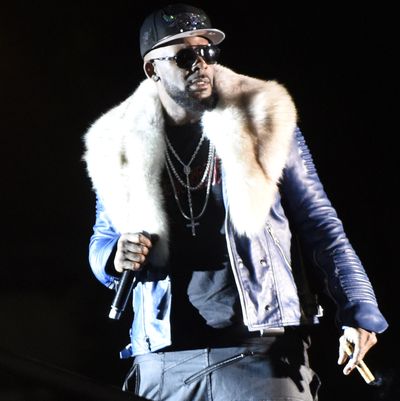
Last summer, on the late singer Aaliyah’s birthday, I made a stomach-churning discovery. As I cranked up her classic debut album Age Ain’t Nothing But a Number, I looked closely at the cover. The album’s producer, Robert Sylvester Kelly, lurks in the background, watching her, far away but never out of sight. Today, she could be a stand-in for any of the young black women R. Kelly is accused of manipulating and controlling.
Reports of the R&B singer’s abuse of young women circulated long before BuzzFeed’s explosive report this week, which alleged R. Kelly was holding a group of young black women in a “sex cult.” In a 2013 interview with The Village Voice, Jim DeRogatis, the same reporter who broke the recent investigation and has doggedly pursued allegations against Kelly for years, described how Kelly allegedly used his fortune and fame to coerce young black women into underage sexual relationships, filmed sexual encounters, and forced abortions. One of his quotes always stuck with me — and today strikes me as an explanation for how Kelly’s alleged behavior has been allowed to continue for so long: “The saddest fact I’ve learned is: Nobody matters less to our society than young black women.” Indeed, ignoring the unique plight of black women has become an American habit.
In everything from the fight for wage equity to pressure against police violence, black women are often rendered invisible in the justice fights that depend on our labor. And if social justice ignores us, we certainly can’t expect dominant culture to count us. Whether it’s the 53 percent of white women who chose their race over their womanhood in the recent election or the white men who publicly insult us as we work, being both black and a woman is too often a lonely proposition. When America gets a cold, black women get the flu — and it’s no different in the realm of intimate-partner violence.
While women of all races are unduly affected by violence, black women continue to suffer intimate domestic abuse, like the sexual and mental control Kelly is now accused of, at a rate of 2.5 times more than any other race. But black women are less likely to report this violence. Whether it is our churches commanding we be long-suffering enough to never air our dirty laundry, our fears of how our men will be treated by police displacing our need to care for ourselves, or the pressure to live up to the “Strong Black Woman” trope, we are accustomed to enduring abuse without recourse. A predator must carefully select his prey, and young black women are perpetually among the most in need, the most abused, and the least likely to tell. They’re an all-too-perfect victim for a calculating, sadistic mind.
The music industry has been turning a blind eye to well-documented accusations against Kelly for long enough to sustain his career. He still performs worldwide. He continues to make and sell albums. He has collaborated with some of the world’s most popular artists. And Kelly has continued to operate in plain sight, inking songs about age taboos, lurking in the corners of their album covers, and actively dodging direct questions about his propensity for teenage women. No one calls themselves the “Pied Piper of R&B” without knowing exactly what he is doing — and Kelly has successfully dodged legal responsibility for his alleged actions for nearly two decades.
Every time we choose to Step in the Name of Love, and every time we buy a record or a concert ticket, we prove Kelly’s calculations right. We become complicit in perpetuating not just rape culture, but a culture that demeans and devalues black women. Consumer money paid for Kelly’s dozens of court settlements. It is long past time to withdraw our support.




